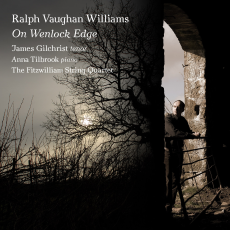Vaughan Williams - James Gilchrist - sa-cd.net
Artistically and sonically this is an outstanding issue. On the evidence of this performance of Vaughan Williams's "On Wenlock Edge" James Gilchrist is very much in his prime vocally. He has many of the characteristics of the classic "English tenor" - a voice basically lyric in nature, naturally tilted towards the upper sections of the tenor register, clean diction, and liquid, unforced vocal production. It suits these settings of A.E. Housman's yearning, loss-haunted poems from "A Shropshire Lad" pretty much perfectly.
Gilchrist has, moreover, some special advantages marking him out from other singers of this repertoire. The tonal quality of his voice, for one thing, runs evenly throughout its register - there are no rough bumps or judderings as he switches from one "part" of the voice to another, technically all is seamlessly integrated.
Secondly, regarding diction, there is no over-emphasis on individual words or syllables, no straining for semantic effects or special pleading - he certainly shades words both dynamically and colouristically, but never at the expense of longer arcs of structure and of melody.
The lack of mannerism in Gilchrist's singing is also notable - Peter Pears, by contrast, was undeniably a great artist, but had noticeable technical quirks and idiosyncracies (often wickedly parodied), and even Ian Bostridge isn't entirely free from this type of personal "birthmark" in his vocalism. It can become distracting on repetition.
Gilchrist is simply an extremely well-schooled, natural singer, capable of sustained warmth and generosity of expression, and also of a tougher edge when needed. Both extremes are well illustrated in the third of the "Wenlock Edge" settings, the magnificent "Is my team ploughing?", where he scales the voice down considerably for the ghostly questioning of the dead lover, then jolts the listener back into the rude light of day for the blunt responses of the living man who has replaced him. "On Bredon Hill" is another beautifully sustained and concentrated performance, its potentially sprawling seven minutes held raptly together as a single, cogent outpouring of nostalgia and emotion.
The other pieces on the disc are no less impressively negotiated. Specially impressive is Ivor Gurney's "Ludlow and Teme" (Housman again), a seven-song cycle which deserves much wider currency than it has had on record previously. Gilchrist's hushed account of "Far in a western brookland" here is particularly effective, very finely gauged indeed both technically and emotionally.
The Fitzwilliam Quartet are omnipresent, and excellent, and a special word is needed for the highly sensitive playing of pianist Anna Tilbrook, tellingly punctuating the musical narrative without ever seeming obtrusive.
Linn's engineering (I listened to the SACD multichannel layer) strikes me as notably successful. Quartet, piano and voice is a very difficult combination to capture convincingly, and with judicious tweaking of balances the voice here is cleanly focused, and the accompaniment registers clearly without becoming over-insistent.
The overall ambience is on the warmish side of neutral, and it's possible some listeners will hanker for even sharper definition but I like the homogeneous feeling of a live performance here, without the musicians being TOO sharply compartmentalised in their performing spaces. The discreet use of rear channels brings the usual benefits of a larger, more living soundstage and more "air" round the performance.
All told, this is a very fine achievement, a most attractive and intelligent choice of repertoire which I think will not quickly be replicated in the SACD medium. I hope that Linn will do more recordings with Gilchrist, and that they will continue to be in SACD format.

